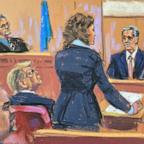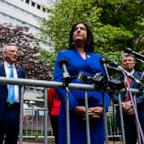Court hears pre-term case on Clinton film
WASHINGTON -- The Supreme Court was poised to open the door to more corporate spending in political elections Wednesday, after a fast-paced special hearing over campaign finance regulation.
If the conservative majority moves in that direction — which would require reversing past decisions that endorsed such corporate restrictions — it would not be without a fight. The liberal justices, including senior Justice John Paul Stevens, were especially vigorous in their counterarguments Wednesday in the dispute that could transform the rules for corporate and labor union money in politics.
The specially scheduled oral arguments revolved around a 2008 movie by the conservative group Citizens United that attacked Hillary Rodham Clinton when she ran for the Democratic presidential nomination. Hillary: the Movie presented a 90-minute montage of news clips and harsh commentary against the former first lady by critics such as Newt Gingrich. A senator from New York at the time, Clinton lost the Democratic nomination to Barack Obama, and she is now secretary of State.
The legal case escalated when Citizens United sought to offer Hillary: The Movie through a TV video-on-demand service, and the Federal Election Commission said it was subject to a 2002 campaign finance law. Part of a larger overhaul of campaign finance rules, the disputed provision bars TV or radio ads financed with corporate or union money just before an election.
Citizens United said it made a documentary, not a campaign ad, and that the FEC move to block the video offering violated its rights of free political speech. A special three-judge federal court in Washington, D.C., disagreed, endorsing the 2002 law and saying the film amounted to a campaign message to vote against Clinton.
After the Supreme Court's first round of arguments last spring, the justice issued an order in June asking the lawyers involved to address the broader question of the constitutionality of government restrictions on corporate spending in elections.




